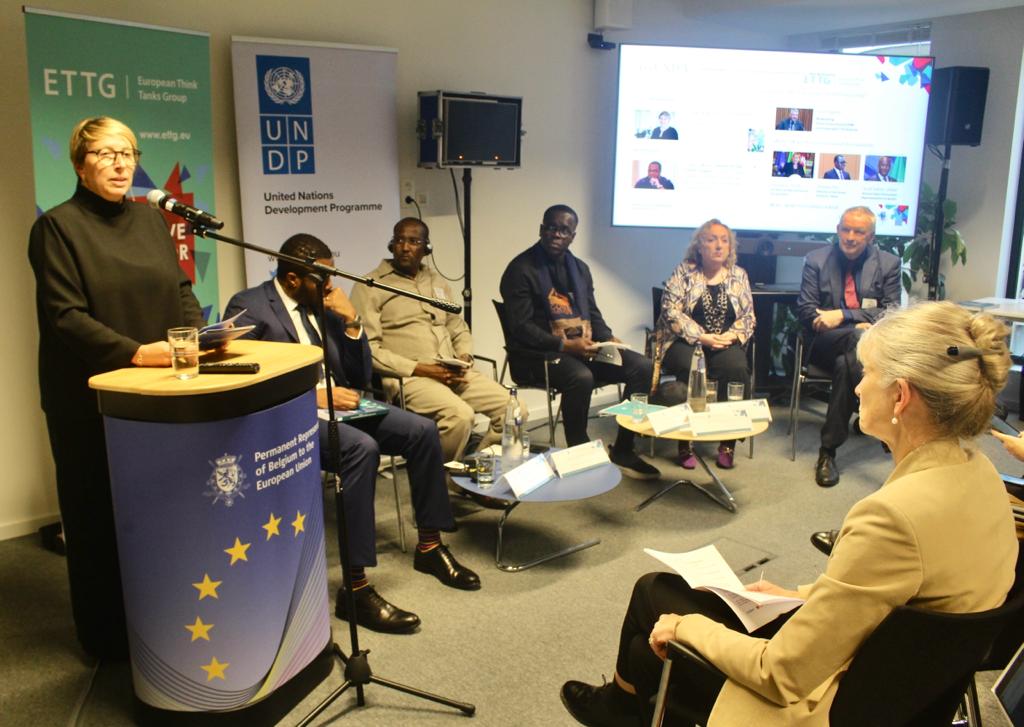Flagship report looking at drivers of coups and strategies for preventing them discussed with key partners in Brussels
Preventing coups in Africa calls for people-centred approaches
October 27, 2023

Discussion in Brussels focused on the recent resurgence of military coups in Africa and the significant implications for decision-makers on the continent and beyond.
The recent resurgence of military coups has placed democracy in Africa at a critical juncture, and poses significant implications for decision-makers on the continent and beyond. A broader political backdrop that has seen democracy being eroded across the globe adds further urgency to the call for better responses and improved interventions to guide countries amid, or at risk of, such crises.
Speakers unpacked this trend yesterday in a conversation titled ‘Conflict and unconstitutional change of government in Africa: is there still a role for the Europe-Africa partnership?’, co-hosted by the UN Development Programme (UNDP) and Belgium’s Ministry of Foreign Affairs Foreign Trade and Development Cooperation in collaboration with the European Think Tanks Group (ETTG).
The discussions drew on a recently launched report UNDP, titled ‘Soldiers and Citizens: Military Coups and the Need for Democratic Renewal in Africa’. In this unprecedent study, the drivers of coups and strategies for preventing them are examined through the eyes of citizens who directly experienced unconstitutional changes of government (UCG). The findings of the report collate interviews with 8,000 people across eight different African countries to offer insights into the most complex features of the current coup trend. Among them, 5,000 respondents had directly experienced a recent coup or UCG. These countries include Burkina Faso, Chad, Guinea, Mali and Sudan. Their views were contrasted with those of 3,000 citizens from countries on a path of democratic transition or consolidation, namely The Gambia, Ghana and Tanzania.
Among others, the research highlights that citizens across the continent are becoming increasingly intolerant of states that fail to deliver on their democratic promise of inclusive economic growth, improved security and real measures for curbing corruption. This democratic disillusionment contributed to ephemeral popular support for coup leaders in some contexts. Yet, the survey participants across all contexts expressed a clear preference for democracy as their governance of choice; marked by credible elections, gender equality, civil rights protection and, importantly, governments that deliver tangible benefits to the populace. The findings add urgency to the need for approaches from all actors to place people-centred democratic renewal at their core.
Opening the event, Caroline Gennez, Belgium’s Minister for Development Cooperation and Major Cities, emphasized: “The situation in the Sahel is incredibly complex and unstable. Democracy and human rights are under pressure. Extremist violence is on the rise. As development partners, we are faced with the fundamental question of how we – Belgium, but also the EU – can stay engaged in increasingly volatile political contexts while making sure our work still has an impact. And doing so in a coordinated manner. The report presented by UNDP is clear: business as usual will not suffice in the Sahel. Besides introducing more flexibility and support for civil society in our development cooperation in the short term – which Belgium will be doing through its new Civic Space Initiative – it is also crucial to reflect on the long term. With all the expertise, insight and brain power brought together at this event, I am confident discussions will yield great results.”
The study also brings to light a clear correlation between coup risk and developmental indices. States that have recently experienced UCG typically display lower global development and governance indicators. This trend is not necessarily causal but is symptomatic of a vast populace grappling with systemic exclusion and rights infringement. Such grievances can be harnessed by coup leaders and are worsened when development aid is curtailed. While addressing these structural factors is paramount to preventing coups, contexts that have experienced UCG call for people-first and people-friendly solutions from development actors.
“There is also hope and opportunity in all post-coup transitional processes. These are critical entry points for international and regional actors to shape better outcomes for a swift and sustainable return to civilian rule and constitutional order. Achieving that means fundamentally reimagining what our responses look like in countries undergoing, or at risk of unconstitutional changes of government,” said Camilla Brückner, Director of the UN/UNDP Office in Brussels and Representative of the UN System in the EU.
In May 2023, AU Heads of State and Government reiterated a zero-tolerance stance against UCG and called for collective action in developing a robust mechanism for deepening democracy and collective security on the continent. The newly launched Africa Facility to Support Inclusive Transitions (AFSIT), a collaborative initiative by the AUC and UNDP, is an innovative initiative aimed at providing comprehensive programmatic support to African countries undergoing, or at risk of, complex political transitions. A pilot phase of assessment missions to UCG contexts is scheduled to take place in November 2023.
For more, visit soldiersandcitizens.org

 Locations
Locations